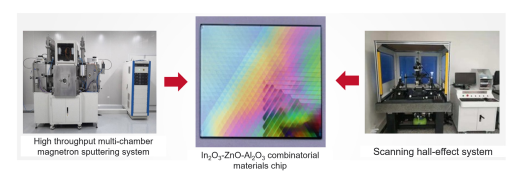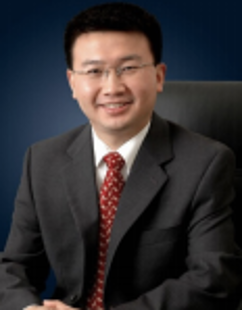High-throughput process windows screening based on continuous gradient combinatorial materials libraries
Yong Xiang*, Zongkai Yan
University of Electronic Science and Technology of China, Chengdu, 611731, China
EXTENDED ABSTRACT: The volume manufacturing of electronic devices involves fabrication processes such as thin film vapor deposition, crystallization, activation, annealing, photolithography, and so on. Unlike the laboratory material processing, industrial manufacturing process parameters, such as gas pressure and processing temperature, may fluctuate as a function of time. Such fluctuations may cause variation of composition and structure, as well as non-uniformity across the plane. To ensure volume and yield, it is necessary to have certain process parameter windows, which often determine the volume manufacturability of materials and devices. To establish process windows, the thin-film combinatorial materials chip technology that we developed in previous works may be applied to produce continuous gradient combinatorial materials libraries as functions of process parameters [1]. From these materials libraries, the performance variations can be determined as functions of process parameters as well, which in turn yield the process windows. Examples on high-throughput screening of process windows for phase change memory materials and amorphous oxide semiconductors are demonstrated.

REFERENCES: [1] Yan Z, Wu S, Song Y, et al. Rev Sci Instrum, 91, (2020) 065107

Yong Xiang is currently a Professor and Dean of Advanced Energy Institute at University of Electronic Science & Technology of China (UESTC), Chengdu, Sichuan. Prior to joining UESTC in 2009, he was a Senior Engineer and Project Manager at Intel Corporation, Santa Clara, CA. He served in several national science and engineering programs as panel expert or consulting member, including China's Materials Genome Project with Chinese Academy of Engineering and Chinese Academy of Sciences, National Project on Key Materials R&D and Applications, National Advanced Energy Program, etc. He is currently developing high-throughput experimentation tools for materials genome engineering, with applications to solidstate Li-ion batteries, compound semiconductors, and piezoelectric sensors. He has published more than 200 articles and filed more than 200 patents. He received his BS from University of Science & Technology of China, MS and PhD from Harvard University. * Corresponding author: xiang@uestc.edu.cn